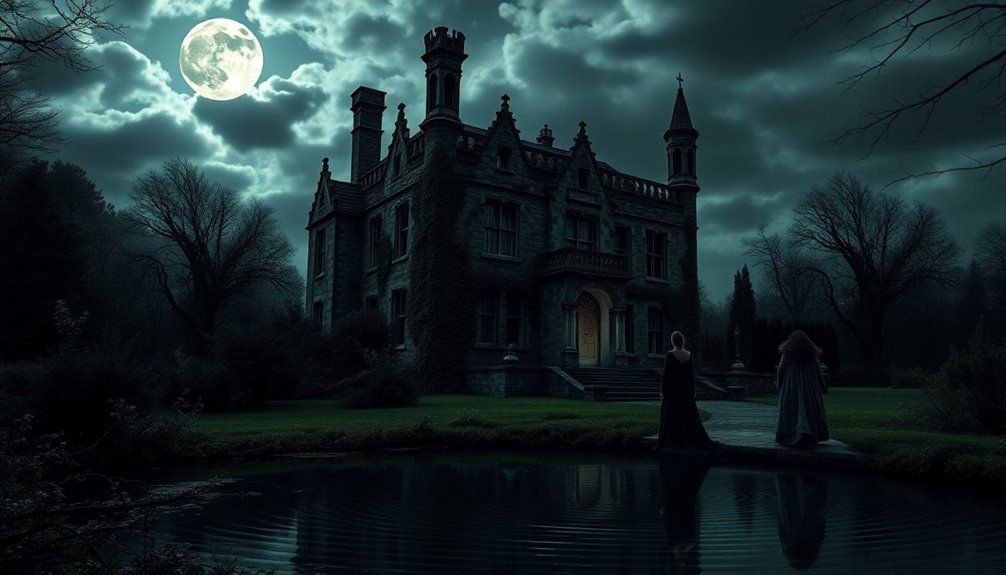Daphne du Maurier's *Rebecca* immerses you in a world of Gothic mystery, rich with themes of identity and obsession. As you follow the unnamed narrator's journey, you'll witness the haunting influence of Rebecca's memory at the eerie Manderley estate. The psychological tension unfolds through her struggles with jealousy and her complex relationships with Maxim de Winter and Mrs. Danvers. Manderley, with its opulent yet decaying beauty, symbolizes the past's grip on the present. This novel not only captivates with its atmospheric setting but also explores deeper themes of self and societal norms. There's so much more to uncover.
Overview of *Rebecca
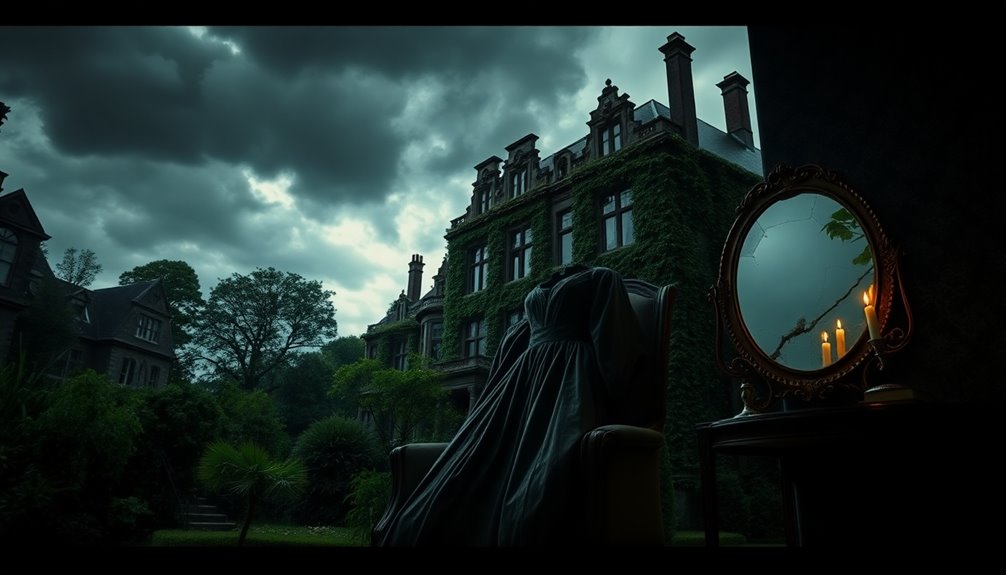
*Rebecca*, published in 1938 by Daphne du Maurier, stands as a cornerstone of Gothic literature, enthralling readers with its intricate exploration of identity and psychological tension.
You'll find yourself drawn into the story of an unnamed narrator, a young woman who marries Maxim de Winter and moves to the haunting estate of Manderley. As she navigates her new life, feelings of insecurity and jealousy consume her, largely due to the everlasting shadow of Rebecca, Maxim's deceased first wife. The novel delves into themes of psychological tension, making it a compelling study of the human psyche. The dark, atmospheric settings in *Rebecca* evoke the essence of Gothic literature, enhancing the sense of mystery and suspense throughout the narrative.
The chilling presence of Mrs. Danvers only heightens this tension, making Manderley itself a character within this Gothic novel. The novel's themes of obsession and jealousy resonate deeply, reflecting the complexities of human relationships and societal expectations.
With over 2.8 million copies sold and countless adaptations, *Rebecca* remains a timeless tale that continues to captivate audiences.
Main Characters and Their Dynamics
In *Rebecca*, the unnamed narrator's evolution highlights her struggle against insecurity, especially in her interactions with Maxim de Winter and Mrs. Danvers. This internal conflict mirrors the themes of disillusionment that Richard Yates explores in *Revolutionary Road*, where characters grapple with their identities.
Maxim's emotional turmoil, stemming from his past with Rebecca, complicates their relationship and adds depth to the story.
Meanwhile, Mrs. Danvers' obsessive loyalty to Rebecca creates a chilling atmosphere that undermines the narrator and drives the novel's tension. The themes of loyalty and betrayal resonate throughout the novel, drawing parallels to other literary works that explore similar dynamics.
Unnamed Narrator's Evolution
The unnamed narrator's journey in "Rebecca" reveals a profound transformation shaped by her relationships and the haunting legacy of the titular character.
Initially, you see her as a timid and insecure young woman, constantly overshadowed by Rebecca's memory. This struggle intensifies at Manderley, where Mrs. Danvers' psychological manipulation reinforces your feelings of inadequacy as the second Mrs. de Winter.
However, as the narrative unfolds, you witness her evolution into a more assertive and self-aware individual. Confronting her fears and the complexities of her marriage to Maxim, she ultimately reclaims her identity.
The climactic revelation of Rebecca's true nature and Maxim's confession marks a pivotal moment, allowing the unnamed narrator to resist Rebecca's lingering influence and embrace her newfound agency.
Maxim's Emotional Turmoil
Emotional turmoil defines Maxim de Winter's character, intricately woven into the fabric of his relationship with the unnamed narrator. As you explore his psyche, you notice how his struggles shape their dynamic:
- Profound grief from Rebecca's memory lingers.
- A quick marriage hints at desperation, not love.
- His internal conflict peaks with the truth about Rebecca.
- Oscillating between affection and anger affects the narrator.
- Themes of love and betrayal complicate their connection.
Maximilian de Winter's emotional turmoil manifests in his inability to fully embrace his new life. His haunted past casts a long shadow, leading to jealousy and insecurity that threaten to unravel their fragile bond.
Understanding his struggles brings depth to their complicated relationship.
Mrs. Danvers' Obsession
Obsession weaves a dark thread through the fabric of Manderley, primarily embodied by Mrs. Danvers. As the housekeeper, her intense loyalty to Rebecca de Winter creates an undercurrent of tension that influences everything.
You'll notice how her obsession manifests in her relentless attempts to undermine your confidence, asserting her dominance within the household. This psychological battle between you and Mrs. Danvers reveals themes of jealousy and identity, as you struggle to find your place in a home haunted by Rebecca's memory.
Her cold demeanor and manipulative behavior serve to preserve Rebecca's legacy, ultimately spiraling into destruction. In a climactic moment, Mrs. Danvers' fixation culminates in the fiery end of Manderley, illustrating the perilous power of her obsession.
Themes of Identity and Memory
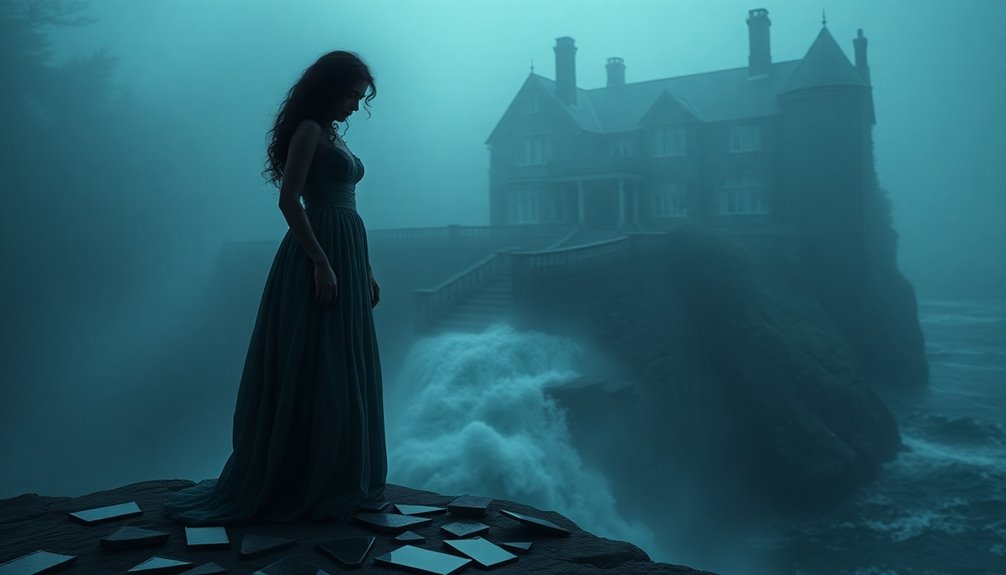
While grappling with her identity, the unnamed narrator of *Rebecca* finds herself constantly overshadowed by the ghost of Rebecca de Winter. This haunting presence shapes her self-perception and influences her relationships, revealing how memory intertwines with identity.
- The narrator's insecurities stem from Rebecca's lingering memory.
- Mrs. Danvers manipulates the narrator's confidence using her obsession with Rebecca.
- The revelation of Rebecca's true nature forces the narrator to confront her own identity.
- The journey towards self-assertion marks a pivotal transformation. This reflects the moral ambiguity prevalent in dark academia, enhancing the complexity of identity struggles. Additionally, the narrator's experience parallels the historical narratives of strong female protagonists who defy societal expectations to reclaim their identities.
- Manderley's destruction symbolizes the need to let go of the past.
Through these themes, you see how memory can define and reshape one's identity, ultimately leading to personal reclamation. Additionally, the novel illustrates how the absence of societal norms can amplify personal struggles with identity and self-worth.
Gothic Elements in the Narrative
In *Rebecca*, the gothic elements are vividly woven into the fabric of the narrative, creating an atmosphere steeped in mystery and dread. Manderley stands as a haunting backdrop, a character in its own right, cloaked in dark secrets and oppressive feelings.
The psychological tension intensifies through Mrs. Danvers, whose obsessive loyalty to the deceased Rebecca instills a pervasive sense of unease. Du Maurier's vivid imagery immerses you in decay and the uncanny, even without actual supernatural events. This sense of decay parallels the symbolism of the secret garden as a significant element in character journeys, emphasizing the contrast between life and death. The struggles depicted in *Rebecca* resonate with the resilience and strength of women facing adversities, showcasing their inner strength in navigating a world fraught with challenges.
As the unnamed narrator grapples with her insecurities, themes of isolation and identity emerge, echoing the psychological depth typical of gothic literature. The suspenseful buildup leads to pivotal revelations, highlighting the oppressive influence of the past and the eventual destruction of Manderley itself. The exploration of generational poverty in *A Tree Grows in Brooklyn* resonates with the struggles faced by the unnamed narrator in *Rebecca*.
Narrative Structure and Style
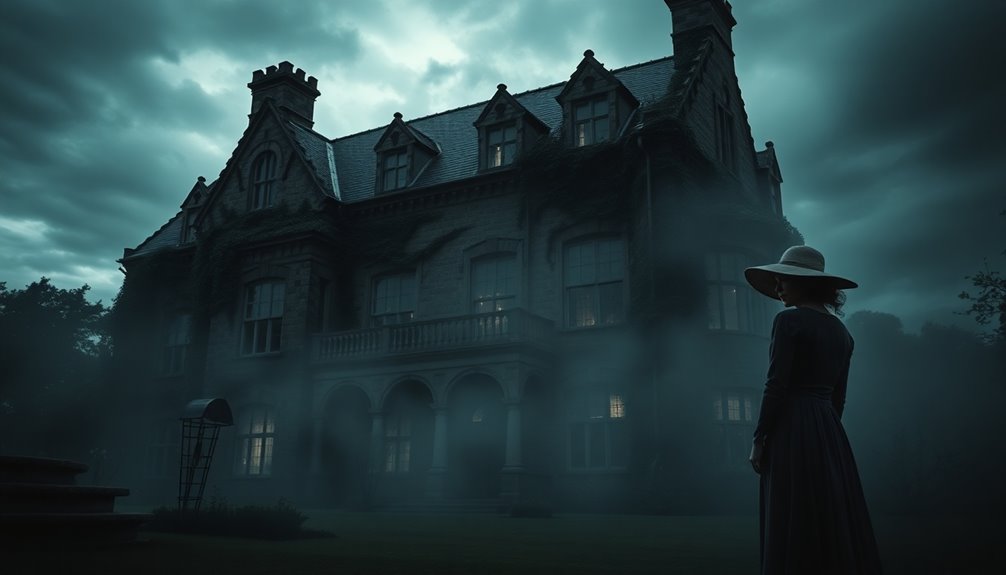
As you explore the narrative structure of *Rebecca*, you'll notice how Daphne du Maurier expertly crafts a slow build-up of tension, particularly in the first half of the novel.
The unreliable narrator adds layers of complexity, making you question her perspective and the unfolding Gothic Romance.
Key elements of her narrative style include:
- Gradual revelation of secrets and character dynamics
- Vivid descriptions that create an immersive atmosphere
- Impactful one-liners that resonate emotionally
- Psychological tension heightened by ambiguity
- A dramatic closing line that twists the plot
Du Maurier's writing captivates, leaving a lasting impression as the tension culminates in stunning climaxes. This narrative technique mirrors the exploration of memory and regret found in other literary works, enhancing the reader's emotional engagement. Additionally, the atmospheric descriptions in *Rebecca* create a sense of mystery akin to the haunting world of the Phantom, immersing readers in a deeply emotional experience. Furthermore, her ability to evoke moral complexity parallels the intricate character development seen in works like *The Stand*, deepening the reader's connection.
You'll find yourself deeply engaged, anticipating the next revelation.
Setting: Manderley Estate
The atmosphere of *Rebecca* is deeply intertwined with Manderley, the sprawling estate that acts almost like a character itself. This grand estate symbolizes beauty and decay, mirroring the psychological turmoil of its inhabitants.
As you explore Manderley's lush gardens and dramatic sea cliffs, you can't help but feel the sense of foreboding that enhances the gothic elements of the narrative. The overgrown nature and opulent architecture create a haunting backdrop that reflects themes of memory and the lingering influence of Rebecca de Winter.
Manderley's isolation amplifies the narrator's feelings of inadequacy, emphasizing the psychological tension that permeates the story. Ultimately, the estate's grandeur stands in stark contrast to its eventual destruction, symbolizing the eradication of Rebecca's haunting presence. This interplay of beauty and decay mirrors the intricate plot twists often found in classic literature, enhancing the narrative's depth.
Psychological Depth and Suspense
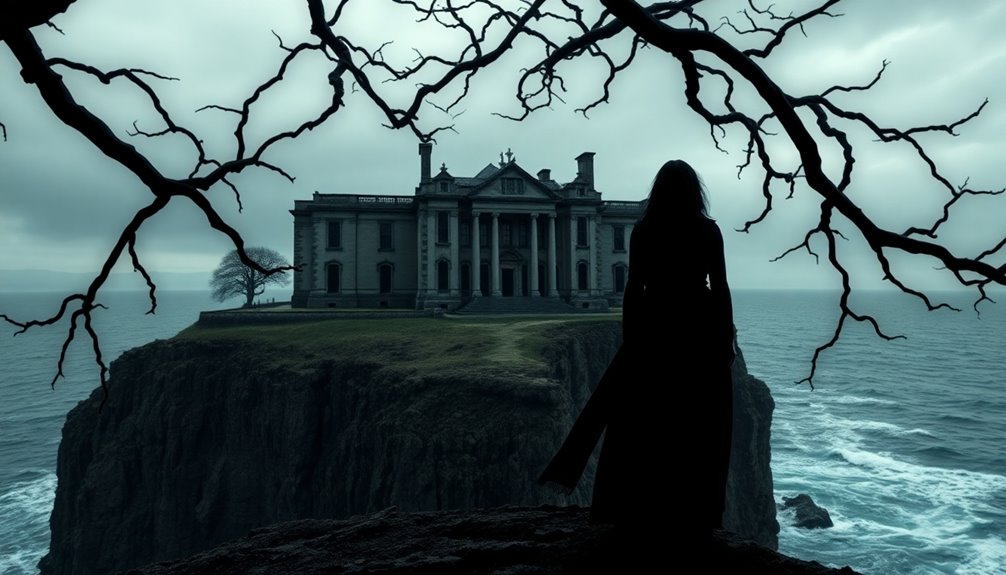
In *Rebecca*, you'll find that haunting memories shape the narrator's identity and drive the story's tension.
The dynamics of obsession and manipulation, especially through Mrs. Danvers, create a gripping atmosphere where every interaction feels loaded with suspense.
As secrets unravel, the narrative pulls you deeper into the psychological labyrinth of Manderley, reflecting the turmoil of its inhabitants.
Haunting Memories and Identity
While grappling with the oppressive legacy of Rebecca de Winter, the protagonist's struggle for identity becomes a haunting journey of self-discovery.
You're constantly haunted by memories that erode your confidence and self-worth.
Mrs. Danvers' obsession with Rebecca amplifies this feeling, as her manipulation reinforces your inferiority.
The oppressive atmosphere of Manderley mirrors your internal turmoil, creating a sense of isolation that deepens your crisis of identity.
As you confront Rebecca's true nature and the circumstances of her death, pivotal moments arise that challenge your understanding of self.
This journey toward self-assertion culminates in the destruction of Manderley, representing your final break from Rebecca's shadow.
- Haunting memories linger
- Identity struggles intensify
- Manipulation reinforces inferiority
- Internal turmoil escalates
- Transformation through confrontation
Obsession and Manipulation Dynamics
Emerging from the weight of Rebecca's haunting memory, the protagonist faces a new battlefield: the insidious dynamics of obsession and manipulation.
Mrs. Danvers embodies this obsession, wielding Rebecca's memory as a weapon to undermine your confidence and identity. You find yourself ensnared in a psychological struggle, as Danvers manipulates your emotions, pulling you deeper into the shadows of jealousy and inadequacy.
Meanwhile, Maxim's complex relationship with Rebecca reveals layers of manipulation, shaped by his own past traumas and guilt. As you grapple with these feelings, you confront the suffocating influence of Rebecca, realizing that her memory controls both your actions and emotions.
This relentless cycle of obsession and manipulation crafts a chilling atmosphere, heightening the suspense that permeates your journey.
Tension-Building Narrative Techniques
How does Daphne du Maurier masterfully build tension in *Rebecca*? She employs various tension-building techniques to create psychological depth and suspense. The gradual revelation of character complexities keeps you on edge and engaged.
- Vivid descriptions of Manderley enhance the oppressive atmosphere.
- The protagonist's transformation highlights her internal struggles.
- Mrs. Danvers' obsession with Rebecca fuels psychological tension.
- Impactful one-liners and dramatic twists maintain suspense.
- The slow build-up of tension in the first half captivates you.
Du Maurier's skillful narrative structure guarantees you feel the weight of Rebecca's shadow, making the story not just a mystery but a profound exploration of identity and fear.
Critical Reception and Legacy
Since its publication in 1938, *Rebecca* has sparked intriguing debates about its critical reception and enduring legacy.
Initially, the novel received mixed reviews; *The Times* even criticized its material as "of the humblest" quality, highlighting a divide between critical and popular reception.
Despite this, you'll find that *Rebecca* has sold over 2.8 million copies by 1965 and has never gone out of print, showcasing its lasting popularity.
The 1940 film adaptation by Alfred Hitchcock won the Academy Award for Best Picture, further cementing its cultural significance.
Today, *Rebecca* is a staple in literature courses, influencing generations of authors and inspiring numerous adaptations, which all contribute to its remarkable legacy in Gothic literature.
Adaptations Across Media
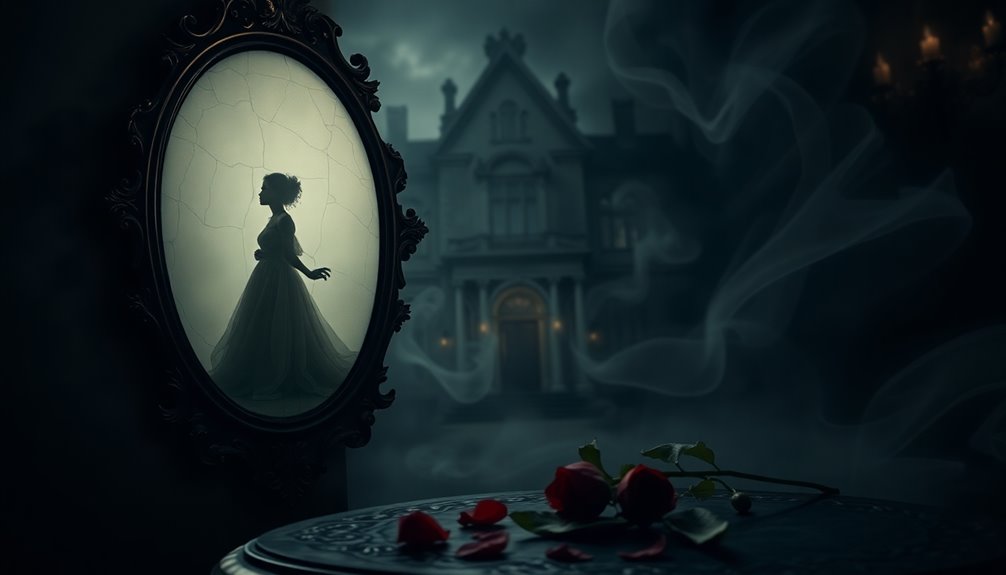
The enduring popularity of *Rebecca* is evident not just in its literary acclaim but also in its diverse adaptations across various media.
You'll find that *Rebecca by Daphne du* Maurier has inspired many retellings and interpretations, showcasing its timeless appeal. Here are some notable adaptations:
- Alfred Hitchcock's 1940 film, which won the Academy Award for Best Picture.
- A successful musical adaptation that premiered in London's West End in 2020.
- A new Netflix film adaptation released in 2020, directed by Ben Wheatley.
- Various radio dramas that bring the story to life through sound.
- Graphic novels that reinterpret the classic tale visually.
Each adaptation highlights the story's richness and its ability to resonate across generations.
Author Daphne Du Maurier
Daphne du Maurier's early life shaped her unique voice, drawing inspiration from her artistic family and the haunting landscapes of her estate, Menabilly.
Her writing career took off with the success of *Rebecca*, which not only established her in the Gothic genre but also showcased her knack for psychological realism.
As you explore her works, you'll notice recurring themes of family history and identity that reflect her personal experiences.
Early Life Influences
Born into a family steeped in the arts, Daphne du Maurier's early life was a rich tapestry of influences that would shape her literary career. Her father, a prominent actor, and her mother, an accomplished novelist, instilled a passion for storytelling in her.
Her experiences fostered key elements in her writing:
- Childhood visits to Milton Hall inspired Manderley's setting
- Exposure to Cornwall's coast added atmospheric landscapes
- Strong literary background enriched her psychological themes
- Personal struggles influenced her protagonists' identities
- The nameless narrator in Rebecca reflects her own insecurities
These formative influences helped her craft enthralling narratives, blending gothic elements with deep psychological insights that resonate through her works.
Writing Career Highlights
A remarkable writing career unfolded for Daphne du Maurier, beginning with her groundbreaking novel *Rebecca*. Published in 1938, it quickly became an iconic work of gothic literature, selling over 2.8 million copies by 1965.
This success led her to sign a three-book deal with Victor Gollancz, receiving a £1,000 advance that solidified her as a prominent author.
Du Maurier's influence extended beyond the page; her works were famously adapted into films by Alfred Hitchcock, further blending her legacy with cinema.
Alongside *Rebecca*, she penned notable titles like *Jamaica Inn* and *Frenchman's Creek*, showcasing her versatility and cementing her status as a key figure in 20th-century literature.
Each piece continues to resonate with readers today.
Themes in Du Maurier's Works
Themes of identity and obsession weave intricately through Daphne du Maurier's works, drawing readers into the emotional landscapes of her characters.
You'll notice how characters struggle to forge their identities amid the shadows of others, like the unnamed narrator in *Rebecca*, who battles her self-worth against Rebecca's haunting memory.
Jealousy also permeates her narratives, influencing relationships and creating psychological tension.
Key themes include:
- The search for self-definition
- The impact of memory on the present
- The effects of jealousy and obsession
- The suffocating atmosphere of isolation
- The gothic decay of settings, like Manderley
These elements coalesce, showcasing du Maurier's mastery in exploring the complexities of identity and the darkness of obsession.
Influence on Modern Literature
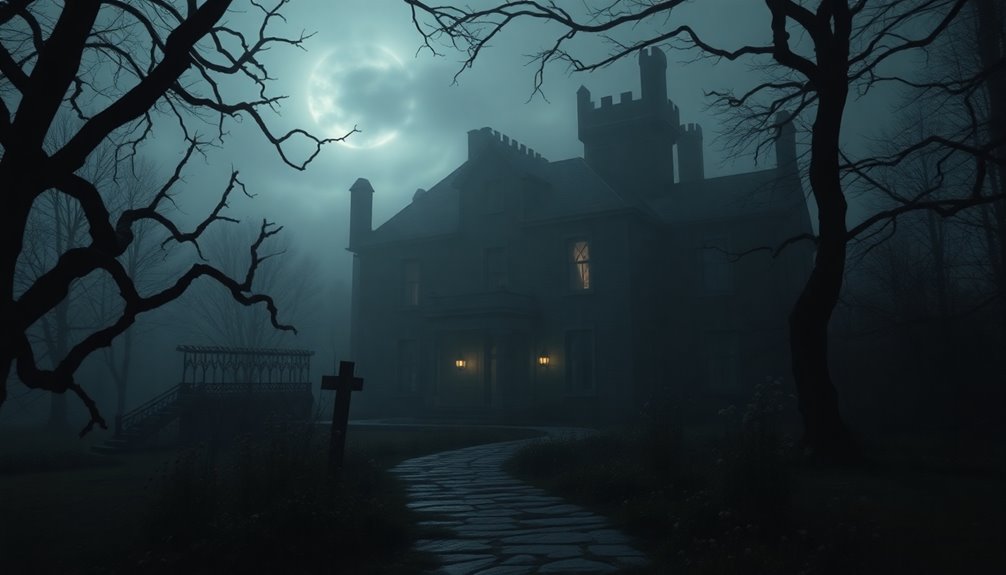
*Rebecca* has shaped modern literature in profound ways, especially within the gothic genre.
You'll notice its impact in the complex female characters and psychological depth that resonate with themes of identity and memory in contemporary works.
The novel's exploration of jealousy and obsession has inspired writers like Stephen King and Jasper Fforde, who weave similar motifs into their narratives.
Du Maurier's blend of gothic elements with psychological realism set a new standard, influencing how authors explore human emotions.
The haunting presence of Rebecca serves as a recurring archetype, delving into how past relationships shape current identities.
Moreover, *Rebecca* critiques gender roles and highlights female agency, paving the way for feminist readings that deepen our understanding of women's experiences in today's storytelling.
Literary Parallels and Inspirations
As you explore *Rebecca*, you'll notice its rich connections to classic literature, especially with *Jane Eyre* and *Wuthering Heights*.
These parallels highlight themes of identity, obsession, and the complex dynamics between women and men.
Additionally, the allegations of plagiarism reveal how *Rebecca* sparked conversations about literary influence and originality.
Influences From Classic Literature
While exploring the depths of gothic literature, you'll find that *Rebecca* is deeply influenced by classic works, particularly those of the Brontë sisters. The themes of haunting pasts and identity struggles in *Jane Eyre* resonate throughout Du Maurier's narrative.
Here are some key influences:
- Rebecca de Winter embodies the "Mad Woman in the Attic" archetype, akin to Bertha Mason.
- The obsession between Maxim and Rebecca echoes the tormented relationships in Wuthering Heights.
- Jealousy plays a vital role, reminiscent of Anna Karenina.
- Du Maurier's nameless protagonist invites readers to project their own insecurities.
- The exploration of female repression reflects societal views from classic literature.
These elements enrich Rebecca, weaving a complex tapestry of gothic intrigue.
Allegations and Similarities
Despite its acclaim, *Rebecca* has faced allegations of plagiarism that highlight the complex interplay of inspiration and originality in literature. Brazilian critic Álvaro Lins pointed out similarities with Carolina Nabuco's *A Sucessora*, but Daphne du Maurier denied these claims.
In 1944, Edwina Levin MacDonald filed a lawsuit, alleging that *Rebecca* copied her work *Blind Windows*, yet the court dismissed the case in 1948, affirming du Maurier's originality.
The novel draws literary parallels to Charlotte Brontë's *Jane Eyre* and Emily Brontë's *Wuthering Heights*, particularly in their shared psychological themes of obsession and the lasting impact of deceased women.
Du Maurier's exploration of complex female characters showcases her unique voice, despite the surrounding controversies.
Cultural Significance and References
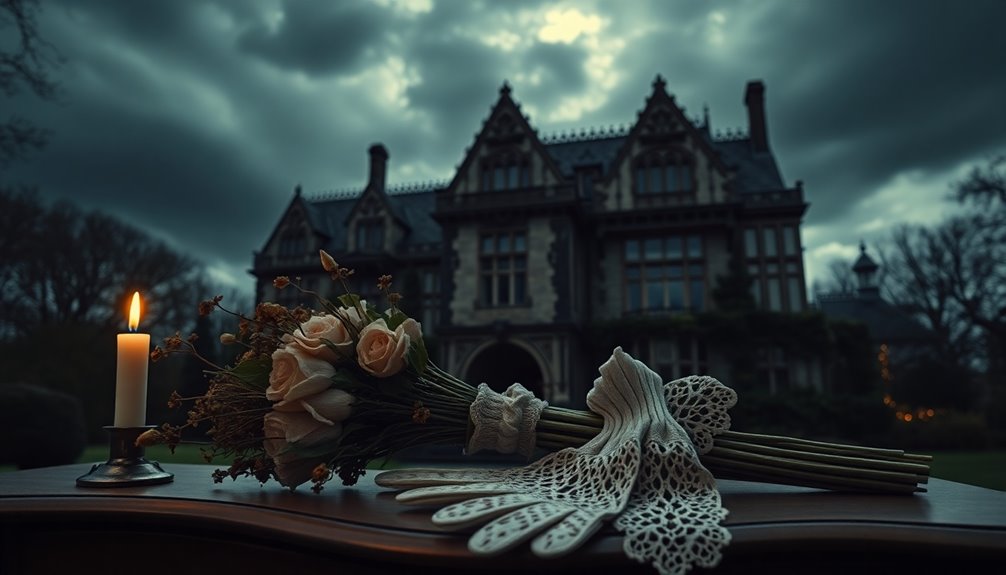
Though *Rebecca* was published over 80 years ago, its cultural significance remains profound and relevant today. You can see its impact in various ways:
- Over 2.8 million copies sold, never out of print
- Iconic characters like Mrs. Danvers and settings like Manderley
- The 1940 film adaptation won an Academy Award for Best Picture
- Numerous modern retellings showcase its adaptability
- Themes of jealousy, identity, and memory resonate with contemporary audiences
These elements not only highlight Rebeccas enduring presence in Gothic literature but also its exploration of psychological and feminist themes.
As you explore the story, you'll find that its complexities continue to spark conversation and inspire new generations, proving that its cultural significance is truly timeless.
Reception Over Time
*Rebecca*'s journey through literary history highlights its complex reception over time.
When it debuted in 1938, the novel faced mixed reviews; *The Times* even labeled it as material of "the humblest" quality. Despite this, it quickly became a bestseller, moving over 2.8 million copies by 1965 and staying in print ever since.
The 1940 film adaptation by Alfred Hitchcock won the Academy Award for Best Picture, greatly boosting the novel's popularity.
Today, *Rebecca* enjoys a high average rating of 4.25 out of 5 from over 669,000 ratings, indicating its lasting appeal.
Its influence spans various adaptations and retellings, demonstrating the novel's cultural significance and relevance in literary discussions throughout the decades.
Lasting Impact on Gothic Fiction
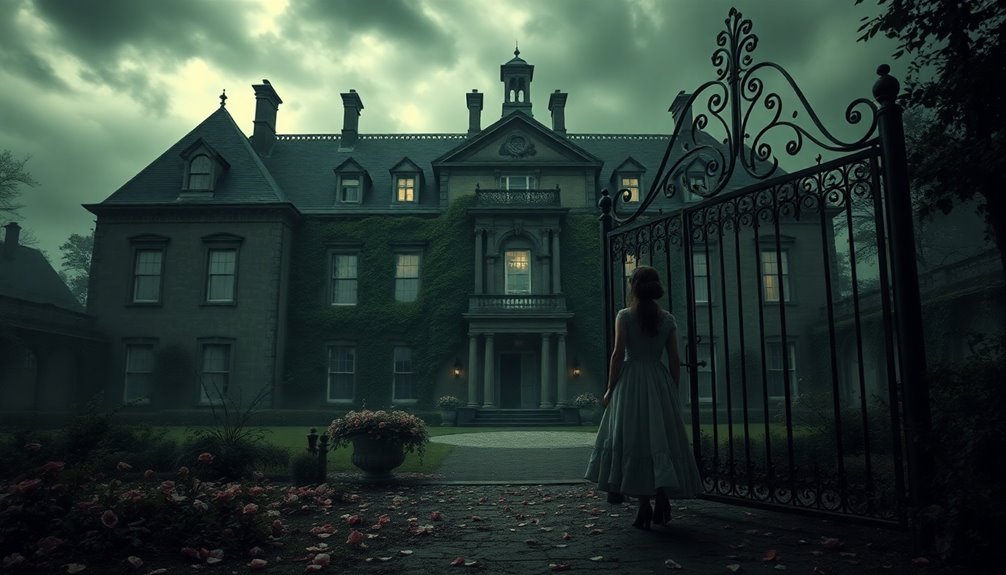
As readers explore the world of Gothic fiction, they can't help but notice the profound impact *Rebecca* has had on the genre. Its blend of psychological depth and atmospheric setting redefined what Gothic narratives could achieve.
Here are some key influences:
- Established complex characters grappling with identity and obsession.
- Inspired adaptations in film, theater, and literature, ensuring its themes remain relevant.
- Paved the way for nuanced portrayals of women's psychological struggles.
- Set a standard for atmospheric settings, with Manderley as a haunting character itself.
- Influenced modern authors, including Stephen King, by combining suspense, romance, and psychological tension.
Rebecca not only enriched the Gothic tradition but also shaped its evolution for future generations.
Conclusion
In *Rebecca*, Daphne du Maurier weaves a haunting tale that lingers in your mind like a ghost refusing to leave. The intricate dynamics between characters and the rich themes of identity and memory create a tapestry that's as complex as the human psyche itself. As you explore the gothic elements, you'll find that the story's chilling atmosphere not only captivates but also reshapes the landscape of gothic fiction, leaving an indelible mark on literature.

